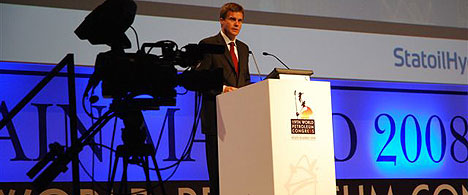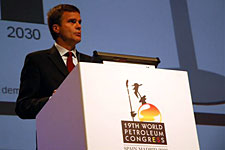
"In my view, we now have the main technical tools to reduce CO2 emissions. What we lack is a firm and predictable regulatory and economical framework. (Photo: Lars Gunnar Dahle)
In his first address to the World Petroleum Congress (WPC) as CEO of the newly-merged StatoilHydro, Helge Lund called climate change “the challenge of our time” and said that the complexity of the issue challenges the world at the very highest political and scientific levels. “In fact, it challenges the capability of the very system of global policy-making,” he said.
“The dilemma of fossil fuels is that they are perceived as both a blessing and a curse. Fossil fuels drive economic development, but they also impact our climate. Any constructive sustainability discussion has to recognise this dilemma,” he said.
No quick fix
“The world is slowly recognizing that there is no quick fix to a less carbon intensive future. Some people claim that it is a lack of will that hinders renewable energy from taking over, but such a view underestimates the huge task it is to substitute oil and gas,” he emphasised.
Helge Lund said that StatoilHydro views climate change as both a challenge and an opportunity:
“It is a challenge as cost of emissions affects our profits and tests our licence to operate. It is also a business opportunity as demand for clean energy and climate technology increases,” the CEO said, underlining that the company is already hard at work on solutions addressing the climate challenge.
Apart for its efforts of building a more material position within renewables, including offshore wind and sustainable biofuels, Lund pointed to concrete ways in which StatoilHydro is contributing in real terms to meeting the carbon challenge:
CO2 capture and storage
“On the Norwegian continental shelf, we have already reduced our carbon emissions per barrel produced to a third of the industry average — the lowest anywhere. There are three main reasons for this: first, a firm policy of non-flaring under normal operations; second, early introduction of a CO2 tax in Norway on offshore operations at a level that really made an impact on the bottom line, and third, conscious design of platforms, pipelines and plants to increase energy efficiency. These are examples of doing well by doing good; in other words, saving money and the environment,” Lund said
“We also have more than ten years of practical experience from CO2 storage, and at full capacity we can permanently store three million tonnes of CO2 in the fields where we are involved in carbon capture and storage projects, Sleipner, In Salah and Snøhvit.

CEO Helge Lund called for a global approach to the issue of carbon pricing.
(Photo: Lars Gunnar Dahle)
Natural gas
“Finally, and most importantly, I believe that natural gas offers our biggest opportunity to reduce greenhouse gas emissions. Substituting coal with natural gas in electricity generation could reduce CO2 emissions by two thirds,” he said.
“If Norway’s gas exports were increased by 30 bcm per year and all this gas was used to replace coal-fired power, CO2 emissions would be reduced by twice the total annual emissions from Norway,” he explained.
“Some may see it as a paradox that I advocate the use of more fossil fuels as part of a progressive approach to climate change, but I see natural gas as an effective “energy bridge” to a less carbon-intensive world,” said Helge Lund.
He is a firm believer that man-made technology offers the best solutions to man-made problems.
Call for action
“In my view, we now have the main technical tools to reduce CO2 emissions. What we lack is a firm and predictable regulatory and economical framework,” he said, and called for international political action to set a realistic market price for carbon.
“If CO2 has a sufficiently high price, then we know what to do to reduce emissions. Governments have a key role to play – and there are tough decisions to be made. We need tough, but fair, framework conditions to drive industrial innovation,” said Helge Lund.